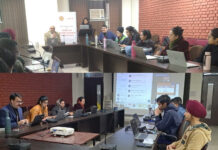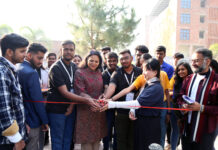The Nobel prize winner for chemistry (2004) Avram Hershko, for physics F Duncan M Haldane (2016) and for medicine Thomas Christian Südhof (2013) are expected to discuss the future of scientific advancements and India’s role in it.

The Congress on the theme ‘Future India: Science & Technology’ is being organised for the first time in Punjab.
Over 30,000 delegates comprising scientists, researchers and students from across 40 countries are likely to participate at the event, which will conclude on January 7.
 A time capsule with 100 items representing a cross-section of today’s technology and India’s scientific prowess was buried on Friday at Lovely Professional University (LPU) here by three Nobel laureates on the occasion of the on-going 106th Indian Science Congress.
A time capsule with 100 items representing a cross-section of today’s technology and India’s scientific prowess was buried on Friday at Lovely Professional University (LPU) here by three Nobel laureates on the occasion of the on-going 106th Indian Science Congress.
The time capsule is a container storing a selection of objects chosen as being typical of the present time, buried for discovery in the future, a varsity release said.
The capsule will remain buried for the next 100 years.
It contained items like replicas of Mangalyaan, Brahmos missile, KalamSat and Tejas fighter jet which represent India’s scientific achievements.

The selection represents day-to-day technologies used in today’s India like landline telephone, smart phone, laptop, weighing machine, water pump, stop watch, headphones, handy-cam, drone, VR glasses and pen drive.
Several scientific equipments like rheostat, refrectorscope and double microscope are also part of the capsule.
It also included solar cell and a hard disk with latest documentaries and movies, the release said.
The objective is to capture today’s technological essence for the future generations, the varsity said.
The capsule was buried at a depth of 10 feet by three distinguished Nobel laureates- Hungary-born Israeli biochemist Avram Hershko, British-born American physicist F Duncan M Haldane and German-American biochemist Thomas Christian Sudhof.
















